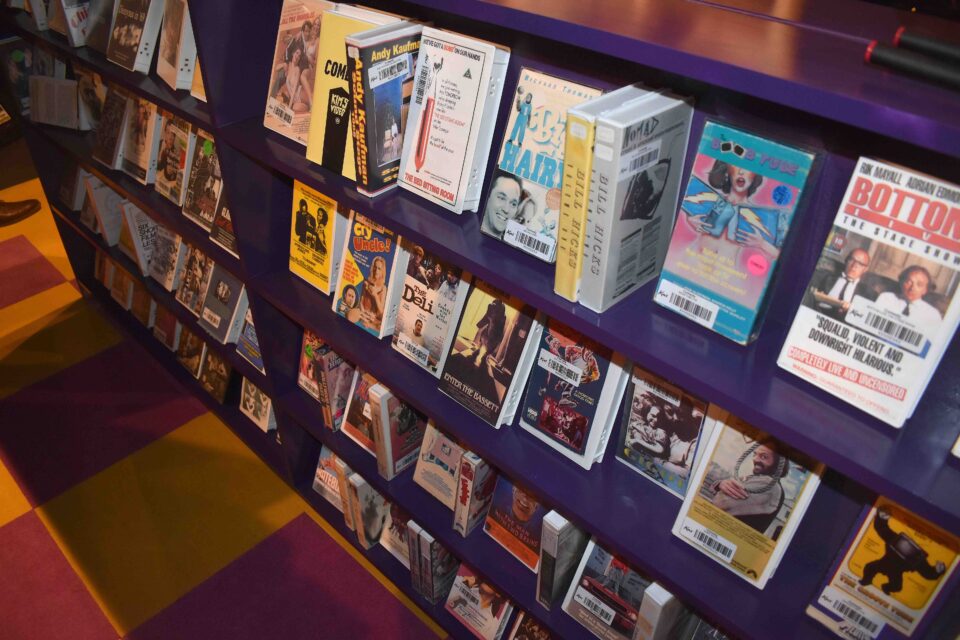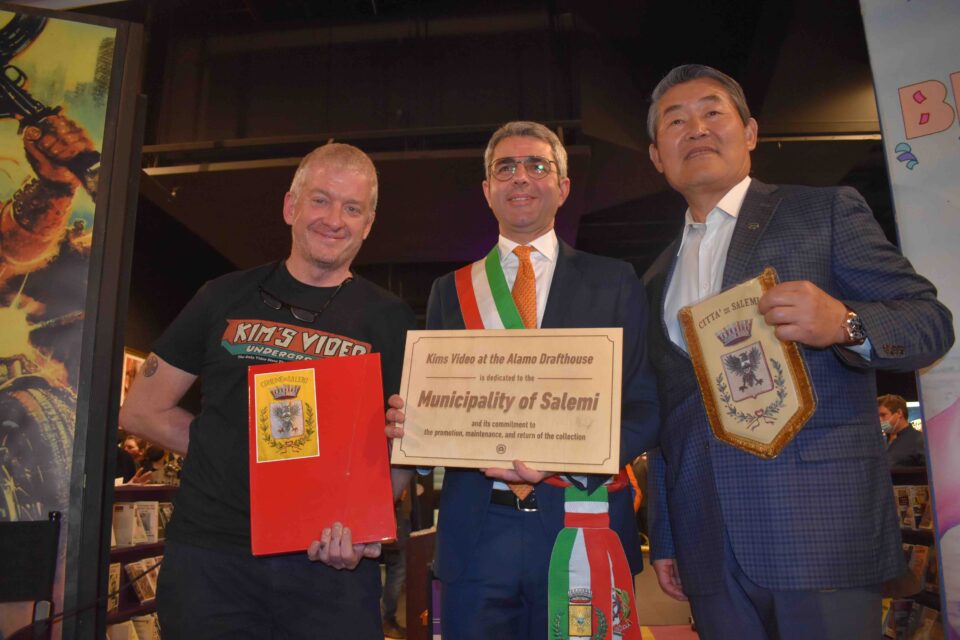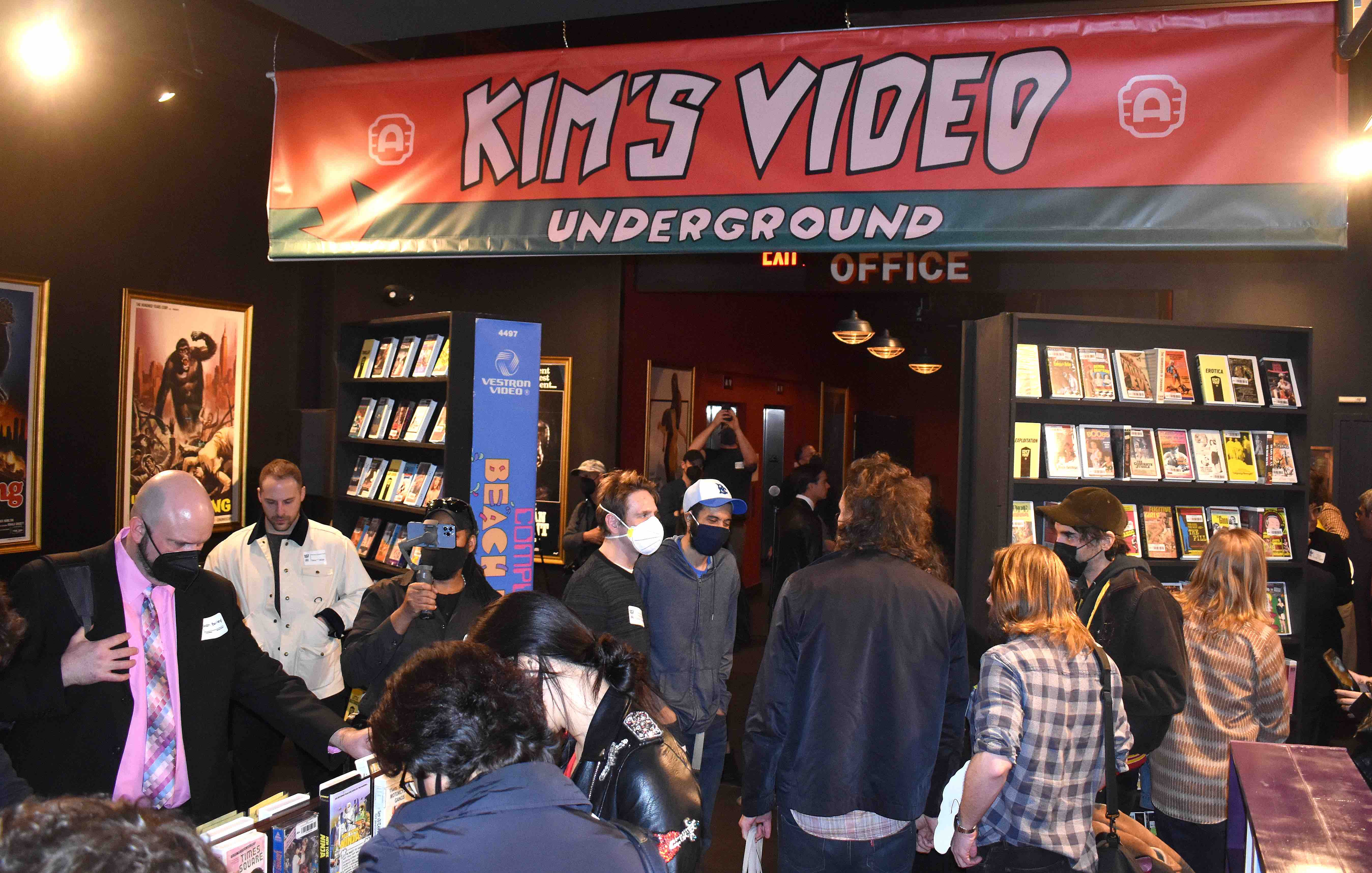In a modern cinematic world littered with endless remakes, the resurrection of Kim’s Video in New York City is one reboot worth watching. Last Thursday at the Alamo Drafthouse at 28 Liberty Street in Lower Manhattan, a scaled-down but still colorful version of the pioneering video store returned after what seemed to be its demise seven and a half years ago. Alamo has already brought Video Vortex stores into four locations including Brooklyn, Raleigh, San Antonio, and Los Angeles, utilizing collections from defunct video stores. But with an iconic name attached, this one’s a little different.
Back in its thriving heyday of the late 1980s through the mid-2000s, Kim’s Video was a refuge for fans of the exotic, the obscure, and the weird. While Blockbuster was busy renting out the latest Hollywood tentpole movies and some indie releases, Kim’s dug deeper into films from around the globe, both foreign and cult titles that were not readily available in most other outlets—some even out-of-print. Exploitation rubbed up against arthouse, T&A alongside the transgressive, low-budget mixed in with no-budget. At Kim’s, taste was thankfully very relative, something cult film aficionados can appreciate. As Kim’s Video founder Yongman Kim told the re-opening party attendees last Thursday: “The guiding philosophy behind it all was always about me combining unique cultures and backgrounds to come together and share.”

And yes, some of Kim’s employees were known for being cagey in terms of their tastes and judging what you picked out. Tim League, co-founder and Executive Chairman of the Alamo Drafthouse chain, told the attendees: “It's important to realize what Kim’s Video was and what it meant to so many people—to so many arrogant, punk-rock, surly, but awesome and creative people. That was their nexus, that was their hub. This video store influenced so many filmmakers and created so much magic. It was just a sense of community, and community is really what we’re trying to build at Alamo. When this opportunity came about to be a part of continuing the Kim’s Video legacy, I was like, ‘Hell yeah, let’s do it.’ I didn’t really think too much about it. It’s probably good, because it was harder than I’d thought.”
“From the beginning, I wanted to be different and have a different collection from every other video store,” Kim tells me at the event. “I was adding the foreign films—Korean, Chinese, Japanese, Eastern Bloc. The cultish film was a very core collection from the starting point. That was very appropriate to start with, and then adding foreign films, especially underground and independent films. It was in the very early years—I would say the mid-1980s and the peak for the 1990s.”
“From the beginning, I wanted to be different and have a different collection from every other video store. I was adding the foreign films—Korean, Chinese, Japanese, Eastern Bloc. The cultish film was a very core collection from the starting point.”
— Yongman Kim
Kim’s Video was an inspiration for local residents, aspiring artists, and famed customers like Quentin Tarantino, Jim Jarmusch, Chloë Sevigny, and Jennifer Jason Leigh. Some of its employees would go on to have future success, including rockers Andrew W.K. and Strokes guitarist Albert Hammond Jr., as well as film directors Alex Ross Perry and Todd Phillips. You could buy or rent thousands of different titles and also purchase an all-region DVD player for watching imports. Originally starting in the dry cleaners run by Kim in 1986, the first store arrived on Avenue A in 1987, and by the mid-’90s there were four locations including the revered Mondo Kim’s, which eventually moved to St. Mark’s Place.
But the gentrification and rising rents of New York City, and the discounting power of online retailers and renters, led to the chain gradually being reduced to one location on First Avenue in 2009 that focused on sales of movies and albums. At that point, the 55,000-title Mondo Kim’s rental collection was shipped off to the small commune of Salemi, Sicily. Then-mayor Vittorio Sgarbi won a bid to obtain it and had planned to build a 3,000-square-foot shrine to Kim’s and offer public access to their sizable back catalog (with Kim’s members not being charged), on top of other ideas to utilize the collection. Then the final Kim’s store closed in late summer 2014, leaving a gaping cultural hole in Manhattan. To make matters worse, the alleged good intentions of the reportedly corrupt and eventually removed mayor of Salemi led to the discovery that the collection was left boxed up and languishing in a dingy storage space—every collector and curator’s worst nightmare.

Luckily, documentarian David Redmon visited that Italian town in 2017, saw the sad state of affairs, and became determined to bring the Kim’s Video collection home. He first contacted Yongman Kim who offered to help him, then connected with League. The trio coordinated with the current mayor of Salemi, Domenico Venuti, to retrieve the collection. It’s taken time and resources, but the large inventory was returned last summer, and a dedicated Alamo team headed by Nick Prueher, co-founder of the Found Footage Festival, is sorting and cataloging the collection, and cleaning up the packaging for re-consumption. Venuti was also in attendance at the re-opening and made some remarks to the crowd. Speaking through a translator, he expressed his happiness in helping to bring the collection back to NYC. Further, he explained that there’s a Salemi museum exhibit dedicated to Kim’s Video, and this summer they’ll start an annual film festival dedicated to showing selections from the collection.
“When this opportunity came about to be a part of continuing the Kim’s Video legacy, I was like, ‘Hell yeah, let’s do it.’ I didn’t really think too much about it. It’s probably good, because it was harder than I’d thought.”
— Tim League
Located on the lower level of Alamo Drafthouse as you walk toward the theater, the new Kim’s Video, which occupies a 160-square foot space, currently features 20,000 of the 55,000 original titles (the others are still being processed) and brings back the glory days of both DVD and VHS. Rentals are free, but, like your local library, late fees apply. You can also rent out VHS and DVD players. It’s a smart move for the pioneering movie chain known for showing cult films beyond their mainstream fare, and also known for demanding that patrons not talk through movies.
“I think Tim [League] will do a very good job,” says Kim. “He's also a businessman, so he knows how to make this entire operation sustainable. It has got to be sustainable. In terms of the operation, I’m not involved. This is solely Tim’s operation.” But he adds that if anything changes or they need him, “I'm pretty sure there’s some role that I can play to support it.”

The truth is that while streaming is ubiquitous in our digital culture, many film buffs still love physical media. Companies like Shout! Factory, The Criterion Collection, Kino Lorber, and Arrow Video cater to them. A man who clearly loves tapes and discs, Kim still has his own library. “Among my private collection I have a lot of the original foreign films that I watched,” Kim reveals. “Eventually, I heard that the [Alamo] team is going to digitize more for streaming. That will be awesome. Already so much of the collection is rare. So this kind of mondo collection definitely appeals to the film community out there.”
When asked what his favorite genre of film to watch was, Kim says he likes student films the best. “We got a very good collection of student films in Mondo,” he explains, still referring to the chain by its most well-known store name. Kim brings up cult filmmaker Nick Zedd, a former Kim’s employee, and his short film Police State which was shot on Super-8 a year before the Tompkins Square Park riot in the summer of 1988. In the short film, a man is accused of being a junkie by the NYPD and arrested, which leads to a horrific conclusion.
“Eventually, I heard that the [Alamo] team is going to digitize more for streaming. That will be awesome. Already so much of the collection is rare. So this kind of mondo collection definitely appeals to the film community out there.”
— Yongman Kim
“That was his very independent underground film,” recalls Kim. “You won't believe how many good student films he brought me. I put five- or 10-minute [films] together and made a good-length independent film collection—like 60 minutes. Martin Scorsese was a big fan in that time. He always sent his assistant to check out those films. I cannot tell how much inspiration he took out of it. But I am very sure a professional film director learned something from the student films—very fresh ideas, very creative ideas.”
For cult movie buffs, the revived Kim’s is a welcome return. It’s heavily stocked with wild and wonderful titles from around the world and across the years. Despite the fact that streaming has become ubiquitous these days, there are still plenty of people who prefer physical media and the joy of browsing and perhaps making new acquaintances. Kim’s Video wasn’t simply a place you went to shop—it created a community, and it can do so again. FL









